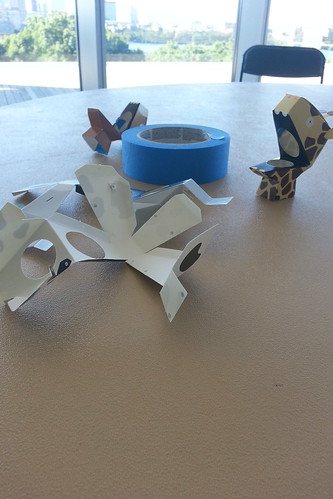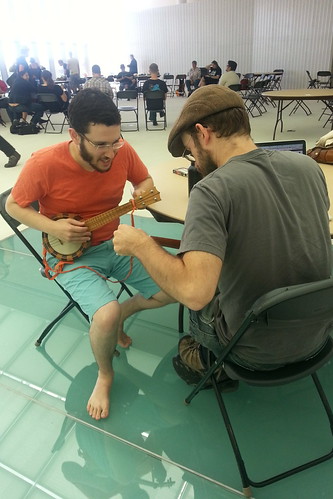
CatCon happened last weekend. An unconference for systems thinkers from varied disciplines, it was an experiment in format as well as in topic. The invite list was small, and it was not publicized outside of that group. Invitees were encouraged to invite another 1-3 people, but a very small percentage of the attendees were new to me. The Media Lab provided the 6th floor for a relatively small fee (custodial and set-up services), and attendees chipped in for food.
Of course I second guess how it went. Of course I over analyze what could have gone better. But the one thing that someone said during closing appreciations made me think that maybe we’re on the right track:
This is the only time I’ve seen the web of trust work.
Unionizing the Revolution / Web of Trust
We read about inspiring things that people are up to fairly often. But rarely do we know the folk behind it, nor do we see how what we do can bolster them (and visa versa). If we’re going to “win,” as I think we should, we should be supporting each other. We should have each other’s backs, and we should call each other (lovingly) on bullshit. We should have focus on what we do, but we should know who else is on our team. The problems the humans on this planet face are huge and complex, and so our responses to them must be as well. This event was an experiment in that.
Structure
We took the first day to get to know one another, lots of ice breakers and running around. We asked questions of each other, and tried to get a feel for what the weekend would be like. Some hadn’t been to an unconference before, and I haven’t been lead on facilitating one before. But everyone was patient and good natured, and we made it through. The sessions for Saturday were curated, based on a conversation I had with Gunner (who has agreed to mentor me in facilitation, zomg!). The arc went over the course of the day from big picture, to meta endeavors, into focused projects, into designing projects. Tracks tended to be in education, interpersonal, economics, security, and co-ops. The goal was to get to know what everyone was working on, and share brain juices. Sunday was dedicated to work, to getting started on linking projects together.
Code of Conduct
So much of this event was about attendees getting to know one another. We needed conflict, and love, and trust. So we had a Code of Conduct. I kind of love writing these. Here’s one of my favorite parts:
Human being are sexual organisms, just like anything else. Harassment happens where there is a lack of consent. At Catalytic, that extends to enthusiastic consent. Act like adults.
Stages of Attendees’ Projects
One thing which was difficult was having such a wide range of expertise in the room. This was further complicated by having many different stages of projects. At most events, you share a common language of discipline with other attendees. Here, we had to learn what people were saying as well as where they were at. From a conversation with Ella Saitta, most boiled down into the following four groups:
- Full-steam-ahead: I have a few questions that the expertise in the room can help answer, but really not up for shifting what they’re up to nor taking on new tasks.
- Looking to scale: Project is plugging along, but could use some tweaks or some links.
- Planning stages: I think my project looks a certain way, but need feedback, advice, assistance.
- Open to signing on: I am super awesome! I have skills, but don’t currently have a project. How is yours?
 What’s Next?
What’s Next?
So next is figuring out if it should be done again. The rest of it is solidly in the hands of the attendees – disseminating notes and figuring out what (if anything) to publish for public review and feedback. But I’m considering if it’s worthwhile to do again, and will base that mainly on the feedback of the attendees. Also talked to Tim Maly about different formats, based mostly off of the Toronto Theater unconference. A bit more structured. Excited to try them out.
Diversity, Nepotism, Inclusion, and Quality Control
The thing is, if this happens again, of how to do the invite list. My own wariness of nepotism and ego have been rebutted throughout the past few days with conversations in good faith because “I knew the person I was talking to was awesome and kind because Willow had invited them.” But most of the people I know are fairly well-off white dudes (whom I adore), and that’s not a revolution I want. So, I’m thinking about how to handle that. Suggestions are requested. The last thing that this world needs is another echo chamber. Well, it needs other things far less, but this is pretty present in all of those issues.
Growing a Community
One thing I think about is, if this takes off and grows into a Thing, is how to maintain accountability in a growing group of people. Nothing drastic went wrong at CatCon (except for when we ran out of coffee), and those failure points are when you see how strong your community and its standards are. I worry about the first time accountability has to be maintained. But I also trust in the links being made to withstand and facilitate that.

Considering #catcon : http://t.co/mKYBu9R9Ws : #blarg
@appliedhistory Here’s a more useful answer than I could have fit in a tweet: http://t.co/pMf7WSUBlg
Sounds awesome. I love the idea of starting really small and building from there. I’ve been thinking about running a barcamp/unconference event locally.. this could be a good way to get it started.